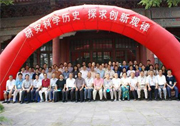| 英文摘要: |
Many factors have played a role on Germany’s road to a powerful science and technology. Among them, the well supported and constantly changing scientific research system has played a crucial role. German science has benefitted from institutional innovation since its inception. Nearly every 100 years, Germany’s scientific research system undergoes major changes. These include the establishment of the University of Berlin in 1810, the establishment of the Kaiser Wilhelm Society (KWG) in 1911, the expansion of the Max Planck Society as the successor to the KWG after WWII., as well as the establishment of three big “non-university research institutions”—the Fraunhofer Society, the Helmholtz Society, and the Leibniz Society—and the “Excellence Strategy” in this century. All of these are milestone events. In addition, German scientists and science-policy makers play an extremely important role. When behind the forefront of research, they humbly learn
from other countries that are more advanced; when they are in a leading position, they take precautions, strive for excellence, and constantly
overcome internal and external pressures in order to maintain their advantages. Always striving for excellence, the German scientific research
system will remain ever dynamic. |





